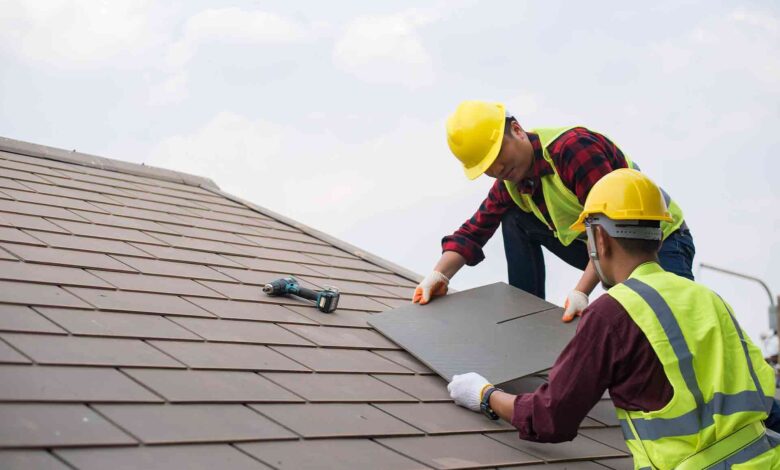Everything You Need to Know Before Hiring a Roofing Contractor

Your roof is one of the most critical elements of your home or building—it shields you from the elements, adds structural integrity, and impacts energy efficiency and property value. When it’s time to repair, replace, or install a roof, working with the right professionals can make all the difference.
Whether you’re dealing with storm damage, aging shingles, or planning a new construction project, understanding how to evaluate and hire a reputable contractor is essential. This comprehensive guide walks you through what a roofing contractor does, how to assess your roofing needs, and what to expect throughout the process.
The Role of a Roofing Contractor
A roofing contractor is a trained specialist responsible for installing, maintaining, and repairing roofing systems. Their work includes handling a variety of materials such as asphalt shingles, metal panels, clay tiles, flat roofing systems, and more. They ensure that the roof is structurally sound, weather-resistant, and installed according to manufacturer specifications and local building codes.
Services typically offered include:
- Roof inspections and assessments
- Roof repairs (leaks, flashing, damaged shingles)
- Complete roof replacements
- New roof installations for homes and commercial buildings
- Gutter installation and repair
- Skylight or ventilation upgrades
- Storm and insurance claim repairs
Because the roof is your first line of defense against weather, hiring a skilled contractor isn’t just a repair job—it’s a safeguard for your home’s longevity and your personal safety.
When Do You Need a Roofing Professional?
There are several key signs and scenarios that indicate you should contact a contractor:
- Leaks or water stains on ceilings and walls
- Missing, curling, or cracked shingles
- Sagging rooflines or uneven surfaces
- Granules in gutters from deteriorating shingles
- Storm or hail damage
- Roof age—most roofs have a lifespan of 15–30 years depending on material
Even if there’s no visible damage, routine inspections can identify weak points before they turn into expensive repairs.
Choosing the Right Materials
Different roofing materials offer different aesthetics, lifespans, and performance under specific conditions. Your contractor will help determine the best option based on budget, climate, home style, and energy goals.
Some of the most common roofing materials include:
- Asphalt shingles: Affordable, durable, and easy to install—ideal for most residential homes.
- Metal roofing: Long-lasting, recyclable, and great for shedding snow and rain.
- Tile roofing: Elegant and fire-resistant, but heavier and requires strong support.
- Slate roofing: Extremely durable and beautiful, though high in cost and weight.
- Flat roofing systems: Often used for commercial buildings, with options like TPO, EPDM, and built-up roofs.
Each material has its pros and cons, and an experienced contractor can explain which aligns best with your goals.
What to Expect from the Roofing Process
Working with a roofing contractor typically involves the following stages:
1. Initial Consultation & Inspection
A technician will visit your property, inspect the current roof, and discuss your concerns. They’ll assess damage, ventilation, and underlying structural elements to develop a plan.
2. Detailed Estimate
You’ll receive a written estimate that outlines costs for materials, labor, timeframes, and warranty terms. Reputable professionals will answer questions and break down each component so you can make an informed decision.
3. Permits and Prep
The contractor will handle permits if required. Before the project starts, protective measures such as covering landscaping or moving outdoor items will be taken.
4. Roof Work
During installation or repair, the old roofing materials are typically stripped off. Repairs to decking or flashing are completed before new materials are installed. This step can take a day or several, depending on the size of the roof and weather conditions.
5. Clean-Up and Final Inspection
After the work is complete, the crew will clean up nails, debris, and leftover materials. A final walk-through ensures the job meets expectations and building standards.
Questions to Ask Before Hiring
Hiring the right professional is as important as the materials used. Here are essential questions to ask any contractor before signing:
- Are you licensed, bonded, and insured?
- Do you have references or a portfolio of recent projects?
- What warranty do you offer on labor and materials?
- Will you provide a written estimate and contract?
- How will you protect my property during the job?
- Who will be supervising the crew on-site?
- What’s the timeline for completion?
A reputable roofing company should be able to confidently answer these questions and provide documentation upon request.
Red Flags to Watch Out For
Unfortunately, not all contractors operate with integrity. Look out for:
- High-pressure sales tactics or demands for immediate commitment
- Unusually low estimates (which may signal cut corners or hidden fees)
- Lack of proper credentials or vague answers about insurance
- No written contract or warranty
- Out-of-state companies with no physical presence or follow-up support
Your roof is too important to leave in unqualified hands. Always do your due diligence before signing.
Roof Maintenance Tips
Even with expert installation, routine care extends the lifespan of your roof. Here are a few preventative maintenance tips:
- Schedule annual inspections and after major storms
- Keep gutters and downspouts clear to prevent water backup
- Remove debris like branches or leaves
- Trim overhanging trees
- Address small repairs promptly to prevent escalation
- Monitor attic ventilation and insulation
Your roofing company may offer a maintenance program or check-ups as part of their service offerings.
Why Professionalism Matters
While DIY projects can be rewarding, roofing is not the place to cut corners. Improper installation can lead to:
- Water damage and mold growth
- Higher energy bills from poor ventilation
- Voided manufacturer warranties
- Structural issues or roof failure
Working with a professional roofing company ensures that your roof is installed or repaired according to industry best practices, safety regulations, and manufacturer standards.They also carry the right insurance to protect both your home and their workers, giving you peace of mind throughout the project.
The Value of Warranties and Aftercare
Always inquire about warranties on labor and materials. A good contractor stands behind their work. Most roofing materials come with 20–50 year warranties, but these are only valid if installed correctly.
Aftercare may include:
- Follow-up inspections
- Emergency repair services
- Documentation for insurance claims
- Guidance on care and maintenance
When you invest in a high-quality roof, you’re not just purchasing shingles and nails—you’re securing protection for your home, finances, and family.
Final Thoughts
Whether it’s time for a simple repair or a complete roof replacement, working with a trusted contractor ensures quality, durability, and peace of mind. Don’t rush the decision. Take time to research, compare estimates, and ask questions.The roof over your head deserves expert attention, and the right team will treat your home with the same care and respect they would their own.




